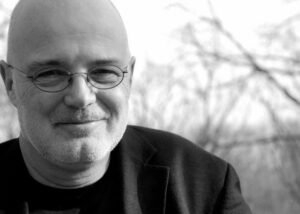Psalm 23: An Interview with Rev. Brian McLaren

Psalm 23: An Interview with Rev. Brian McLaren
 Reverend Brian D. McLaren is an American pastor, author, speaker, and leading figure in the emerging church movement.
Reverend Brian D. McLaren is an American pastor, author, speaker, and leading figure in the emerging church movement.
McLaren is also associated with postmodern Christianity. This resource is a personal reflection on McLaren’s relationship with the Psalm throughout his spiritual journey.
1. What is your earliest memory of chanting, singing, or studying Psalm 23?
I grew up in a conservative Christian home. It wouldn’t be inaccurate to call it fundamentalist, although my parents were always at the most open and charitable wing of whatever congregation they were part of. Before I could even read, my parents had me memorizing passages from the Bible. I think the first was from the New Testament, intended to guide me to be nicer to my little brother: “Be ye kind to one another” (Ephesians 4:32). Back in those days, King James was our only translation, so I memorized all the -eths, thee’s, and thou’s. I believe Psalm 23 was the first whole Psalm I ever memorized. I can imagine wrestling with restoreth and anointest.
Why did my parents want me to memorize this psalm? I’m quite certain they wanted me to feel a personal connection to God, to think of God as someone who knew my name and noticed whether I was with the flock or missing. They knew that from earliest childhood, I loved all things connected to nature. So to imagine sheep in green pastures, resting by gentle streams, protected and guided by a caring shepherd … that was a metaphor I could build my life around.
2. What role has this psalm played in your spiritual journey?
I’m glad that this Psalm taught me from a tender age to see God, not as a cosmic policeman about to clobber me, and not as a spiritual scorekeeper counting each time when I was naughty or nice, and not as a distant technician managing the universal mechanism without any emotional attachment, but rather as a caring shepherd whose goal was for me to survive, thrive, and feel fully alive. I suspect that because I loved animals so much as a boy, I found it most meaningful to think of God as caring for literal sheep first, along with the pastures and streams that sustain them. I understood what it was like to love animals, and for me to be one of the animals in God’s flock seemed … perfect.
In my years as a pastor, this was my go-to Psalm for funerals, in part because I knew its relative familiarity brought comfort, but even more because I knew that in the “thin place” of death and mourning, people are unusually sensitive to the closeness and comfort of divine presence. The psalm, of course, is about life, about greenness and life-giving moisture and protection and comfort. But I think that the greater our sense of God’s personal care in this life, the less we fear death. When the universe is our safe pasture and God’s banquet house, how can we be ultimately afraid?
3. Are there specific words, phrases, or images from this psalm that are particularly meaningful to you?
I love the contrasts held together in this psalm. Yes, there are green pastures and quiet waters in life. But there are also steep gulleys and deep, dark valleys. Yes, there are feasts and sumptuous tables, heavy with food and wine. But enemies lurk in the background, ready to pounce or oppress. Yes, there are pursuers, hot on my trail, but God’s bountiful generosity and merciful kindness are even more passionately behind me: they’ve got my back.
That kind of both/and honesty, it seems to me, is what my soul needs. The immature, dualistic, and reactionary part of me wants it all one way or the other: life is all beach or all battlefield. But this Psalm invites me, if I let it, into a deeper, more contemplative space, holding the contraries together, embracing life’s misery and delight in a larger circle of loving Presence.
I feel the need for that contemplative space as acutely as I ever have in these days. Climate change, demagogues, pandemics, cultic religious nationalists, propaganda, and weaponized fake news … it would be so easy to sink into a swamp of anxious despair. I need to face these realities with wide-open eyes, and then, in the face of them all, to dare to believe that no less real are the comforts of the Shepherd, the rod and staff of guidance and protection, the bountiful provision of the table and safe refuge of the house of the Lord.
4. How might we read this psalm today, in these difficult days?
Like nearly all my peers in my conservative Protestant background back in the 1960s, I was trained to read the Bible personally but never politically, spiritually but never socially or economically, and particularly but never universally. (Of course, even that training was a socio-political act, but we didn’t see it.) God’s care applied to me and my individual soul, but not to economics or public policy. It spoke to my destiny in “the sweet bye and bye,” but not to racism or economic inequality or environmental destruction in the fierce here and now. Perhaps most tragically, as I now see it, we were taught to read it as a message exclusively for “me and my fellow Christians” but not for anybody else.
As an adult, I have been converted, so to speak, from reading the text in an exclusively personalistic, individualistic, and escapist way. So now, I find myself stretching to ask, “Could I see God as the shepherd of all of humanity and not just one religion or nation, seeking to guide us all, no exceptions, through pandemics, racial injustice, toxic populism, through ecological overshoot and economic inequality, through hostile polarization and weapons proliferation?”
As I ponder this question, I remember that the psalm doesn’t say, “The Lord is my puppet-master,” or “The Lord is my dictator,” or “The Lord is my machine operator.” The shepherd seeks to feed, lead, and guide sheep — living creatures with a will of their own. As far as I can tell, sheep are never terribly controllable, and they seem less trainable than a dog or horse. So even as I ponder God’s guiding universal presence, I am reminded of our shared responsibility to be guidable, to maintain a deep inner receptivity to wisdom from beyond our current understanding.
5. Is there anything you might alter in this psalm if you were to rewrite it today?
In the years since I memorized this Psalm as a little boy, I have become more aware of how God, the Bible, and religion, in general, are often enlisted in unholy causes. Often, a first step on the path to religious malpractice occurs when we take metaphors used to describe the Mystery and treat them as if they are objective descriptions of God. Next to nobody takes the metaphor of shepherd literally, of course, but few realize that the word “Lord” (in English) is itself a metaphor.
Meanwhile, too few of my fellow Christians understand the deep Jewish reverence associated with the unspeakable divine name to which the word LORD (all capitals in English) points. Instead, the word Lord comes to mean a supreme authority figure who has more in common with an ancient emperor, medieval autocrat, or contemporary dictator than a shepherd. The problem is intensified when the English pronoun “he” is used interchangeably with Lord/LORD. Presto: God is rendered as an alpha male Supreme Being, a divine macho demagogue, an unaccountable omnipotent autocrat, inviting arrogant humans to posture themselves in that inflated image. Add whiteness to the mix, and you have a dangerous cocktail indeed.
I like what my Jesuit friend John Dear has been doing to try to remedy this distortion of God-talk. He substitutes the God of peace for the Lord and for each male pronoun in the Psalms. As I savor Psalm 23 with that simple substitution, I notice how the flavor of the word “you” changes when I address the divine mystery directly: God of peace, my shepherd … you. Amen.
Questions for Reflection
- What is your earliest memory of chanting, singing, or studying Psalm 23?
- What role has this psalm played in your spiritual journey (if any)?
- Were you surprised or particularly interested in Rev. McLaren’s reflection on this psalm?

